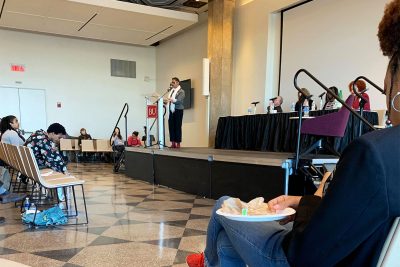While the abolition of slavery in the United States may have occurred with the 13th Amendment, significant discussions about reparations and efforts to repair longtime racial injustices are still prevalent today.

A variety of speakers discussed the plight of and reparations for the descendants of enslaved African individuals in a symposium at the Howard Thurman Center for Common Ground on Friday entitled “Restorative Justice and Societal Repair: Global Racism and Reparations.”
Susan Jane, principal at Navigators Consulting and former director of the Communication and Media Literacy program at the Wheelock College of Education and Human Development, discussed modern restorative justice in a panel titled, “Globalization, Racialism & Reparations: Contentious Past, Factitious Present.” She said accurately portraying racial issues in mainstream media is imperative.
“The work that I do now in the field is about getting people to think about the story that we tell around race,” Jane said in the panel, “so that we can openly tell their stories and engage in better discourse around the issues that are so important.”
Jane recalled a recent news story in which a young black woman was verbally harassed in school by a classmate who followed her around playing whipping noises from his phone. Despite seeking retribution for the assault through the educational system, the victim saw no punishment befall on the male aggressor. Jane said this incident represented her understanding and interpretation on the prejudice and injustice based on race.
The speakers touched upon their extensive research pertaining to African American studies and current movements to further racial equality. One anecdote Jane shared during her panel was the current ethnic controversies surrounding the Fashion Institute and its use of Blackface on the runway.
Nicola Frith, a senior lecturer at the University of Edinburgh, spoke on the connections between past and present oppression during the panel. Frith, whose work is concentrated in the socio-cultural concept of reparations and European slave trafficking, wrote in an email that the symposium brings difficult topics to the forefront.
“These events are incredibly important for sharing ideas, knowledge and understanding the existence of multiple approaches to reparation and reparative justice,” Frith wrote. “I was inspired to be there in order to participate in these important discussions, while bringing my knowledge of the UK sector into the conversations that are going on here in the USA.”
Meredith McDuffie, a panelist at the symposium and senior in the College of Arts and Sciences, said the symposium was one way the HTC pushes Boston University to have these discussions. McDuffie spoke in the panel titled “What Might Restorative Justice & Societal Repair Mean in the 21st century?” and said she believes student involvement on such issues is vital.
“I hope that people took away from it the understanding that reparations and the conversation of reparations is a lot broader and more complex than a lot of mainstream conversation sort of treat it,” McDuffie said in an interview. “I think [events like this] give students an opportunity to engage in conversations that they might not normally engage with on a very academic and professional level.”
In light of these continuous conversations, David Chard, the dean of Wheelock, said he hopes the panel illuminates unification for audiences.
“So much of the practices we employ do not reflect that understanding of open culture, the trauma of peoples that descend from enslaved people, colonized people,” Chard said in an interview. “In order for us to really make a difference in the work we do in classrooms and clinics, et cetera, understanding that and how to repair it is very important.”



















































































































